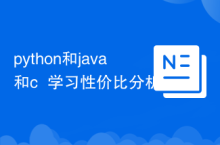
PHP is a powerful server-side programming language that is widely used in web development, database connection, image generation, PDF generation and other fields. In today's globalized world, with the continuous emergence of international trade and multi-language content, how to localize and internationalize Web applications has become a technology that PHP developers must master.
1. Concepts of internationalization and localization
So internationalization and localization are closely related, and internationalization is the prerequisite for localization.
2. Internationalization and localization applications in PHP
In Web development, character encoding is a very important part . If different pages use different encoding methods, the pages will be garbled. PHP can set the character encoding so that the text on the page can be displayed normally.
header('Content-Type: text/html; charset=utf-8');
In internationalization In localized applications, the format of time and date is very important. In PHP, you can use the date() function to format output.
echo date('Y year m month d day H:i:s', time()); // March 01, 2021 15:12:45
The number format and currency format are also different in different regions. In PHP, you can use the number_format() function to format the output.
echo number_format(12345678.90, 2, '.', ','); // 12,345,678.90
In different regions The language used by the country is also different. How to implement multi-language switching in a web application? This requires the use of PHP's multi-language support mechanism. You can use the gettext function library in PHP to achieve multi-language support.
// Load language file
putenv('LANGUAGE=zh_CN');
setlocale(LC_ALL, 'zh_CN');
// Set domain
$domain = 'messages';
bindtextdomain($domain, './locale');
textdomain($domain);
// Translation output
echo _('Welcome to my website ');
3. Precautions for internationalization and localization
Hard-coding refers to writing in the program If you have a fixed string or data, you should avoid using hard coding, and instead save the text and messages centrally in the translation file.
When identifying the user's region and language, you should use the Accept-Language and Accept-Charset headers in the HTTP header, or use GeoIP information to determine the country or region where the user is located.
The cultural background and usage habits of each country and region are different, and targeted localization should be carried out according to the region and language of the user. localization.
4. Conclusion
In the application of internationalization and localization technology, PHP provides a lot of convenience and support. Only by fully mastering these technologies can Web applications be closer to users, more adaptable to different language and cultural environments, and easier to promote and use. Therefore, PHP developers should constantly improve their skills and knowledge to better adapt to the ever-changing technical environment.
The above is the detailed content of Internationalization and localization techniques in PHP. For more information, please follow other related articles on the PHP Chinese website!
 c array initialization method
c array initialization method
 Cost-effectiveness analysis of learning python, java and c++
Cost-effectiveness analysis of learning python, java and c++
 The phone cannot connect to the Bluetooth headset
The phone cannot connect to the Bluetooth headset
 How to take screenshots on computer
How to take screenshots on computer
 Why does wifi have an exclamation mark?
Why does wifi have an exclamation mark?
 switch statement usage
switch statement usage
 Commonly used mysql management tools
Commonly used mysql management tools
 Solution to failed connection between wsus and Microsoft server
Solution to failed connection between wsus and Microsoft server




